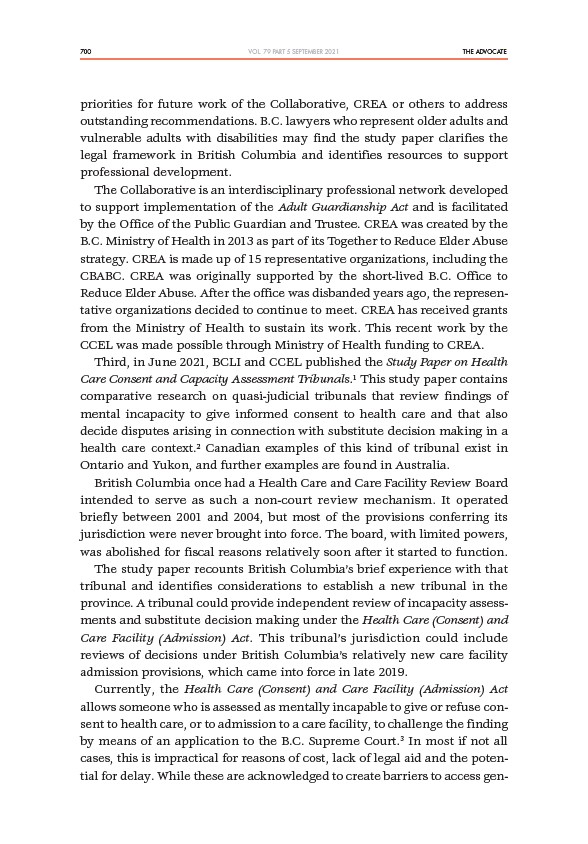
700 THE ADVOCATE
VOL. 79 PART 5 SEPTEMBER 2021
priorities for future work of the Collaborative, CREA or others to address
outstanding recommendations. B.C. lawyers who represent older adults and
vulnerable adults with disabilities may find the study paper clarifies the
legal framework in British Columbia and identifies resources to support
professional development.
The Collaborative is an interdisciplinary professional network developed
to support implementation of the Adult Guardianship Act and is facilitated
by the Office of the Public Guardian and Trustee. CREA was created by the
B.C. Ministry of Health in 2013 as part of its Together to Reduce Elder Abuse
strategy. CREA is made up of 15 representative organizations, including the
CBABC. CREA was originally supported by the short-lived B.C. Office to
Reduce Elder Abuse. After the office was disbanded years ago, the representative
organizations decided to continue to meet. CREA has received grants
from the Ministry of Health to sustain its work. This recent work by the
CCEL was made possible through Ministry of Health funding to CREA.
Third, in June 2021, BCLI and CCEL published the Study Paper on Health
Care Consent and Capacity Assessment Tribunals.1 This study paper contains
comparative research on quasi-judicial tribunals that review findings of
mental incapacity to give informed consent to health care and that also
decide disputes arising in connection with substitute decision making in a
health care context.2 Canadian examples of this kind of tribunal exist in
Ontario and Yukon, and further examples are found in Australia.
British Columbia once had a Health Care and Care Facility Review Board
intended to serve as such a non-court review mechanism. It operated
briefly between 2001 and 2004, but most of the provisions conferring its
jurisdiction were never brought into force. The board, with limited powers,
was abolished for fiscal reasons relatively soon after it started to function.
The study paper recounts British Columbia’s brief experience with that
tribunal and identifies considerations to establish a new tribunal in the
province. A tribunal could provide independent review of incapacity assessments
and substitute decision making under the Health Care (Consent) and
Care Facility (Admission) Act. This tribunal’s jurisdiction could include
reviews of decisions under British Columbia’s relatively new care facility
admission provisions, which came into force in late 2019.
Currently, the Health Care (Consent) and Care Facility (Admission) Act
allows someone who is assessed as mentally incapable to give or refuse consent
to health care, or to admission to a care facility, to challenge the finding
by means of an application to the B.C. Supreme Court.3 In most if not all
cases, this is impractical for reasons of cost, lack of legal aid and the potential
for delay. While these are acknowledged to create barriers to access gen-